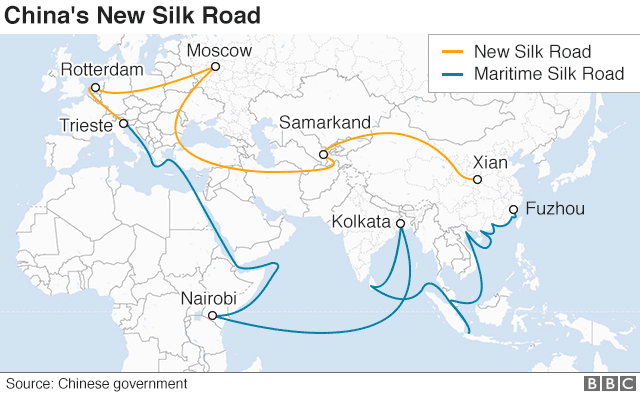Despite the internet and technology being ubiquitous in the west, much of the world still has no access to it. China hope’s to solve this through the development of a “Digital Silk Road”. What effect will this have on Web3 and how does China view the development of Web3 technology?
What is it?
The Belt and Road Initiative (BRI, sometimes known as the New Silk Road) was launched in 2013 and is China’s plan to develop infrastructure across Asia and increase its economic and political influence. Its name comes from the original Silk Road, the 4,000 mile long trade network that stretched across Asia during the Han Dynasty, about 2,200 years ago.
The BRI was originally just made up of a Land and Sea component. However, in 2015, China announced the creation of the Digital Silk Road (DSR) as an extension of its BRI.

Many in the west are concerned about the impact of the DSR. Nonetheless, the Chinese are determined that the project goes ahead and are doing everything they can to ensure it does. Whether you see the DSR as a boon for the developing world or a danger to freedom, largely depends on the country you live in.
The DSR will focus on the development of much of Asia from a technological point of view. Exactly how it will impact Web3 isn’t clear at present but China’s stance towards the current technology can give us some hints.
China’s Views on Web3
Cryptocurrency
Much like the silk spun by Chinese silkworms drove trade between the East and West 2,000 years ago, China is hoping the creation of the digital Yuan can do the same. In emerging markets today it can take weeks for transactions to clear. Having a widely accepted form of digital currency available for people to use is in the interests of both China and the countries involved in the DSR.
China could one day make the digital Yuan a common currency between itself and other countries, vastly reducing transaction fees and extending China’s influence. The concept has already been implemented in Pakistan in a project known as the China-Pakistan Economic Corridor. The project led to Pakistan’s replacement of the US Dollar with the Chinese Yuan, much to the annoyance of the US Pakistan may be regretting the decision in 2022 however, given their dwindling dollar reserves and the dollar’s recent strength.
The development of digital currency in China will accelerate the creation of other Central Bank Digital Currencies (CBDCs) around the world. The EU, Sweden, and The Bahamas are already known to be piloting digital currencies or developing them. The full implications aren’t understood yet but adoption would likely eliminate the costs of managing cash and making cross-border payments easier.
Whether China’s development of a digital Yuan leads to wider adoption of CBDCs is yet to be seen, but it’s an interesting experiment and the first time anything like this has been done on such a large scale.
Its stance on the wider cryptocurrency ecosystem however is less rosy. The government outlawed crypto trading, mining, and initial coin offerings (ICO)s in September of 2021, citing national security concerns and the “safety of the public’s assets”. Whether these are the real reasons or whether the government is just concerned about losing control of its monetary system is not clear.
Given its stance towards crypto until now, and the opportunity crypto brings for the decentralization of economic power, it’s unlikely China will change its view anytime soon. This is unfortunate; if China were to work on crypto, it could lead to even more innovation in the space and give the crypto ecosystem access to 1.3 billion more customers.
The Metaverse
China’s stance towards The Metaverse is clear; it sees it as an important step in the development of the internet and society as a whole. It created The China Mobile Communications Association (CMCA), its own Metaverse council, in November of 2021.
The CMCA’s head, Yu Jianing, has said that its primary goal will be promoting technological innovation and educating people about the development of The Metaverse and its future. It will also offer support for metaverse related projects in China and explore Web3 collaboration with other developing economies.
In November 2022, the Chinese Ministry of Industry and Information Technology (MIIT) released a four-year action plan to integrate VR technology with industrial applications. This has been widely seen as the first national-level policy supporting metaverse development within China. The plan’s stated goal is to achieve significant technological advances in VR and AR by 2026.
China is clearly taking the development of The Metaverse very seriously. VR is listed among the “key industries” for the next Five Year Plan, yet another sign that China is betting on VR technology and The Metaverse to have a monumental impact on the world.
 The Chinese government seems to view metaverse development as super important to the development of the country.
The Chinese government seems to view metaverse development as super important to the development of the country.
Artificial Intelligence (AI)
The Chinese government is known to be supportive of AI development and has already used it to implement facial recognition and tracking technology across much of the country. China produced about 30% of AI journal papers and citations worldwide in 2021 and accounted for nearly 20% of the global private investment made in AI start-ups.
Companies like ByteDance, the creator of TikTok, have developed incredibly effective algorithms to capture the attention of users. This is why it’s one of the most popular social media apps today.
Despite this, many are concerned about the security threat this poses to other countries. FBI Director, Christopher Wray, has said the bureau has concerns about the US operations of TikTok. He said his concerns include “the possibility that the Chinese government could use it to control data collection on millions of users or control the recommendation algorithm, which could be used for influence operations if they so chose, or to control software on millions of devices”.
If any nation on earth can marshal resources to accelerate AI development, it’s China. The huge population means there’s plenty of data to feed into the algorithms and the government there has the motivation to build AI so it can better manage society.
Many view advanced Chinese AI as a scary idea because of the surveillance state and the government’s power over the population. But regardless of how it’s viewed around the world, China’s AI is going to improve. Should China’s AI make its way into other countries, they may be less willing to be part of the DSR and give China’s AI access to their people.
NFTs
Chinese Authorities don’t appear to be enthusiastic about the use of NFTs, and as previously mentioned, are opposed to most cryptocurrency-related technology (hence why NFTs are referred to as “digital collectibles” in China, rather than tokens).
Despite the government’s opposition, Alibaba and Tencent, China’s two largest tech companies, are investing heavily in the NFT market, suggesting the Chinese public’s interest in the space is strong. Examples include Alipay launching 8,000 limited-edition NFTs based on two pieces of ancient artwork from the Dunhuang Caves and JD.com offering limited-edition NFTs to people who signed up for its annual conference in 2021.
 Alipay’s NFT of ancient artwork found in Dunhuang Cave; bringing the ancient world into the world of Web3.
Alipay’s NFT of ancient artwork found in Dunhuang Cave; bringing the ancient world into the world of Web3.
China’s state-backed Blockchain Service Network (BSN) aims to provide the infrastructure to allow for large scale NFT development. The Director of Red Date Technology, a company helping China build the BSN, says NFTs themselves “have no legal issue in China” provided they don’t involve cryptocurrencies and are built on the BSN.
China wants its NFT market to be free of the scams sometimes associated with it in the West but this doesn’t necessarily mean outlawing NFTs. Instead, China’s banking association has decided to outlaw their use as securities, meaning people can’t trade them or use them with the intent to make money.
China views NFTs more favorably than crypto but is still hesitant about people using them to make money. It will still allow them to be used but without the financial risks associated with them. This might prove to be a wise move given the amount lost in 2022 but could also slow innovation in the space which would be a shame given the promise NFTs hold.
Takeaway
It’s been argued that cryptocurrency is inherently decentralized whilst AI needs centralization for its development and to collect the data. This is why the Chinese government is so hostile towards crypto (unless they control it), whilst being so open to building AI it can use.
Recent protests in China may have unnerved the government and could lead it to rethink some aspects of how it uses AI or its plans for The Metaverse. However, despite its hostile view towards crypto, China sees the blockchain as a key tool in the development of its economy.
It seems that China has a different vision of how Web3 should function compared to what we have in the west. It wants to leverage decentralized technologies to create a society with centralized control. This isn’t necessarily better or worse than how it will likely be used in the West, just different.
It will take decades for us to know which, or indeed if, one form of Web3 is better than the other but until then, it seems like the two systems will continue to coexist, without much interaction between them. Sounds familiar.
Get more insights like this on the business and marketing of the metaverse delivered to your inbox. We’ll never spam you, ever.
Harry Harrison
After spending 3 years traveling around Australia and Asia I began writing about finance whilst stuck at home at the beginning of 2020 thanks to Covid. I've always had a strong interest in business and technology and he thoroughly enjoys learning more about anything connected to the Metaverse, NFTs or crypto. In my spare time he enjoys playing soccer, pool or chess and reading about history, science and technology.
Related Posts
May 15, 2023
Marketing Web 3 Games with Incentivized Token Rewards
Acquiring users for a game is expensive, very expensive. When I previously…
March 7, 2023
Metaverse Marketing – The Emerging Practice
As the digital world continues to evolve, businesses need to stay ahead of the…
October 25, 2022
How TIME Magazine Revitalized Its Brand Using Web3
Web 3.0, although a relatively young group of technologies, has already been…



